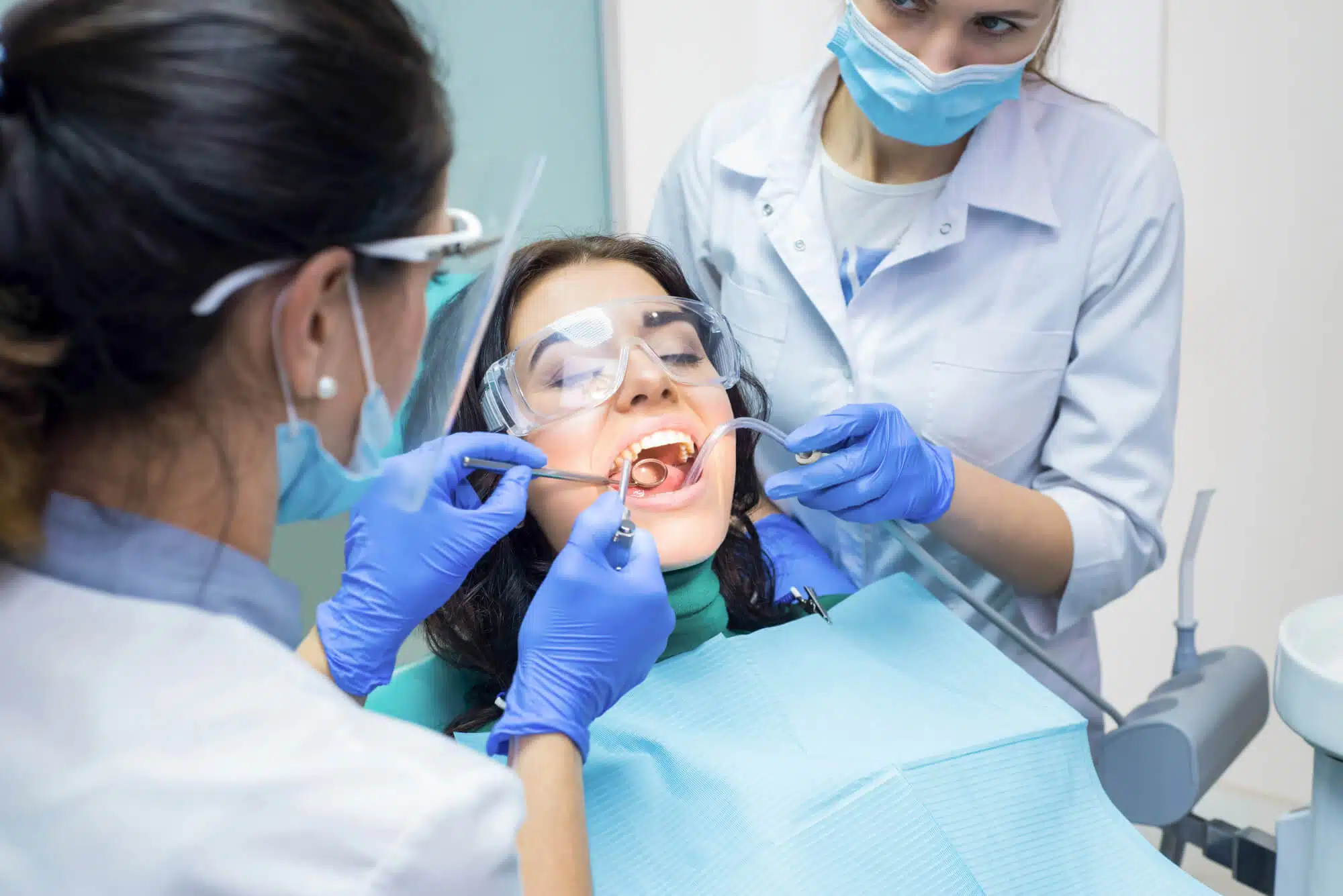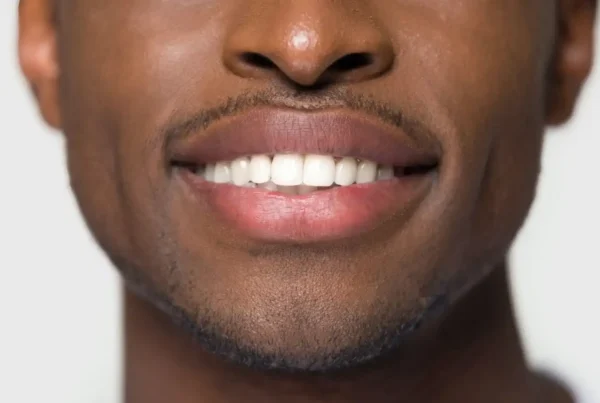Do you ever admire the kind of smile that makes you ask, “How did that tooth crown dentist do it?”
You are not alone!
Dental crowns, done by a skilled tooth crown dentist, are some of the best-kept secrets behind those perfect smiles. In fact, dental crowns top the list as one of the most common restorative procedures in dentistry worldwide. But what’s up with these tooth lifesavers? Let’s get right into it.
What is a Tooth Crown?
Also known as a tooth cap, a tooth crown conceals an injured tooth. It re-establishes the shape, size, and strength of your natural tooth. Picture it like a helmet for your teeth, offering protection and support.
Crowns can be made from different materials, including porcelain, metals, or a combination of both. The choice depends on which part of your mouth needs treatment and advice from your dentist.
Here’s how a tooth crown works:
- Protection: Protects weakened or injured teeth from getting worse
- Restoration: Returns lost function to a broken down or decayed tooth so that you may bite & chew properly.
- Aesthetics: Enhances smile appearance by hiding stained or poorly shaped teeth
The crowns are sized exactly to fit over your natural tooth. Your dentist will ensure that the color matches perfectly with your other teeth to make them nearly undetectable.
Why Would You Need a Tooth Crown?
You may need a tooth crown to:
- Fix a tooth with a large cavity.
- Hold together a cracked or severely worn-down tooth.
- Protect a tooth after a root canal.
- Enhance the look of a tooth that is malformed or stained.
- Support a dental bridge.
- Restore a tooth worn down from grinding or acid erosion.
- Cover a dental implant.
- Prevent decay in a high-risk tooth.
What Types of Tooth Crowns Are There?
Our tooth crown dentist, Dr. K, does various types of dental tooth crowns. Each type serves a specific purpose. Below is a detailed account of the different types:
Porcelain Crowns
Our porcelain crowns look natural because they are made of high-quality ceramic. They match existing teeth well, and many people use them for front teeth. They do not stain easily, so their appearance stays the same. If someone has metal allergies, it is a good option. New dental ceramics that look nice and are strong are used to make these crowns.
Metal Crowns
Most of the metal crowns are made of gold, chromium, nickel, or palladium. These crowns are very durable and long-lasting. They endure heavy biting forces, too. They do not crack or wear down easily. Because they are metallic, they are not suited for front teeth.
However, they are great for molars or hidden teeth. Advanced alloys are used today, which are better than before and suited for people.
Porcelain-Fused-to-Metal (PFM) Crowns
A great advantage is that PFM crowns offer both strength and beauty. They have a metal base coated with porcelain, which means they have the strength of metal and the appearance of porcelain. Thus, they can be used on the front or back teeth and ofter are used in dental implants.
PFM technology now bonds metal and porcelain better. This cuts chipping risk and improves fit and look.
Zirconia Crowns
These dental crowns are strong and last long. They resist chips and cracks. They look like real teeth.
We know from experience that Zirconia crowns hold up to heavy chewing. Newer ones have better transparency. They look more natural.
Resin Crowns
The best part, resin crowns are cheap and versatile. They chip and crack more easily than others.
These dental crowns are good temp fixes but not for strong chewing. Newer resins look better but not as strong as porcelain or metal.
Stainless Steel Crowns
These dental crowns are quick and cost-effective for kids’ teeth or temp fixes. They handle chewing well.
It’s important to know, stainless steel crowns are also for adults. They’re temporary fixes before the lasting restoration arrives. They fit tightly and work well for protection and support.
Dental Crown Procedure Details
What growth starts from the dental crown procedure? Dr. Behrooz Khademazad at Grand Prairie Family Dentistry presents a direct solution for dental crowns. The standard protocol is usually one or two visits.
First Visit
During your first visit, we will sand the outer layer of your tooth and ensure it is fit by taking a piece off so the crown can be placed properly. We will keep you safe by giving you a local anesthetic.
After this, we will make a replica of the tooth’s form. We can press the impression into a mold or scan your mouth digitally. Then, we will send this information to a lab, where a technician will place your custom crown and size it to the color of your teeth for a natural look.
When a CEREC machine is used, you can get the desired results much faster, and the crown is usually produced and placed on the same day. If the lab makes a crown, a temporary crown will be placed, covering the affected tooth as a solution. However, your real crown will take 2 to 3 weeks to be made.
Second Visit
When your permanent crown is complete, you will stop by for the second appointment. During this visit, the temporary crown will be removed first, and then the new crown will be checked for size, shape, and color. Ultimately, the crown will be glued to your tooth with dental cement.
Revamping a decayed or broken tooth with dental crowns is an ideal decision since regular filling treatment may lack the required outcomes. He ensures that every step in this regard is specially made to serve your dental needs. He wants to offer you a product that will last a long time and give you a natural look.
Average Cost Of Dental Crowns
The price of a dental crown drastically varies depending on the material and other factors used. To be specific, you will approximately have to spend between $500 and $2,500 per crown. It may also be an additional:
- Exams and X-rays
- Procedure Costs
- Preparation Work
The entire cost of a procedure can alter depending on your needs and the complexity of the procedure. The sensible approach is to have a chat with your dentist and find out if your insurance covers some part of the costs. To get personalized advice, it’s advisable to make an appointment with Dr. Behrooz Khademazad at Grand Prairie Family Dentistry.
Possible Advantages and Disadvantages of Dental Crowns
Here are the possible Advantages and Disadvantages of dental crowns you can experience:
Advantages
- Treat worn, broken, or decayed teeth effectively.
- Shields teeth from further erosion and damage.
- Enhances chewing ability and overall function.
- Improves the appearance of your smile.
- It can last between five and 15 years with proper care.
Disadvantages
- Involves removing some natural tooth enamel.
- It may cause temporary sensitivity in the first few weeks.
- Risk of breaking or fracturing over time.
- Potential to trap bacteria and cause decay if not properly fitted.
- Rare chance of allergic reaction to materials used.
- It can be a costly dental treatment.
Act Now!
At Grand Prairie Family Dentistry, your beautiful smile and oral health are our top priority. With the full expertise of Dr. Behrooz Khademazad, your smile gets renewed and your general dental health improves with only the best quality of dental crowns. A crown that fits well not only saves the tooth but also makes you feel more confident.
Dental crowns are a very versatile tool in the field of dentistry. They can enhance your smile by improving its appearance. We know both the functional and attractive smile are very important, and our experienced team is here to help you all the way.
Here is a list of the techniques we apply to you to help you get the best results with dental crowns:
- Consultation: Dr. Khademazad ensures a complete examination of your dental issues is done through his personal appointment with you.
- Personalized Plan: We recommend a treatment plan which in turn is a specially designed plan to cater for your specific needs.
- Advanced Care: Our clinic dispenses the use of the best dental technology and materials in order to make the task smoother and more effective than it has been before.
Schedule a time to see our Grand Prairie dentist. So, find out first-hand how dental crowns can help you show off a great smile and optimum oral health. We are just the people you need to get you a beautiful, long-lasting outcome. Your picture-perfect dentition and overall health are our main concerns at Grand Prairie Family Dentistry.
Schedule a free consultation with us today!
FAQs
1. How long does a dental crown (cap) last?
A good tooth crown dentist will tell you that dental crown typically lasts between 5 and 15 years with proper care.
2. Is it painful to get a crown?
The truth is that there is no room for the pain as local anesthesia is given during the procedure. Dr. Khademazad is a premier tooth crown dentist in Grand Prairie Tx and his goal is painless dentistry!
3. How is a crown placed on a tooth?
A crown is placed by preparing the involved tooth, taking impressions, and then bonding the crown to the tooth with dental cement.
4. Is a crown good for teeth?
Yes, a crown is a dental prosthesis that gives the patient a natural look. It takes the place of old dental teeth.
5. Are crowns fake teeth?
No, crowns aren’t fake ones. It covers the place for your old teeth, restores the smile and function of old ones.
Related Articles
- Crown Materials
- Dental Crown Procedure
- Dental Crown Care
- Dental Crown Problems
- Crown Solutions
- Bridge Dental Solutions
- Dental Crowns Dentist
Google Reviews
See More Reviews From Grand Prairie Family Dental
View information about local places in our community.
Driving Directions to Our Practice
Grand Prairie Family Dentistry
Contact Us
Phone:
972-988-0900 (office)
Address:
2475 W Pioneer Pkwy
Grand Prairie, Texas, 75051









